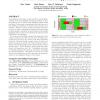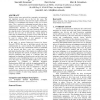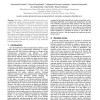105 search results - page 12 / 21 » Distributed Checkpointing Using Synchronized Clocks |
114
click to vote
ISPD
2005
ACM
15 years 7 months ago
2005
ACM
In the nanometer VLSI technology, the variation effects like manufacturing variation, power supply noise, temperature etc. become very significant. As one of the most vital nets...
ICS
2005
Tsinghua U.
15 years 7 months ago
2005
Tsinghua U.
As parallel jobs get bigger in size and finer in granularity, “system noise” is increasingly becoming a problem. In fact, fine-grained jobs on clusters with thousands of SMP...
129
click to vote
ISLPED
2003
ACM
15 years 7 months ago
2003
ACM
Enabled by the continuous advancement in fabrication technology, present day synchronous microprocessors include more than 100 million transistors and have clock speeds well in ex...
125
click to vote
SENSYS
2003
ACM
15 years 7 months ago
2003
ACM
Wireless ad-hoc sensor networks have emerged as an interesting and important research area in the last few years. The applications envisioned for such networks require collaborati...
110
click to vote
DATE
2009
IEEE
15 years 9 months ago
2009
IEEE
Nowadays, in MPSoCs and NoCs, multicast protocol is significantly used for many parallel applications such as cache coherency in distributed shared-memory architectures, clock sync...




